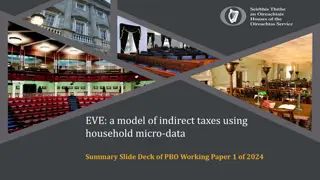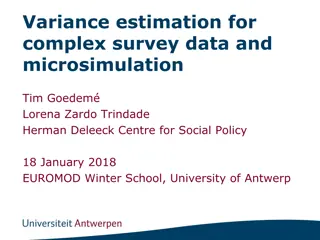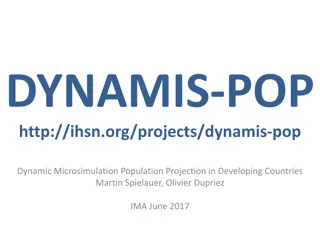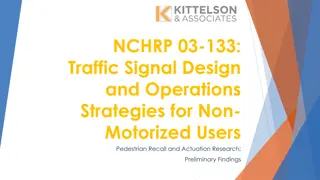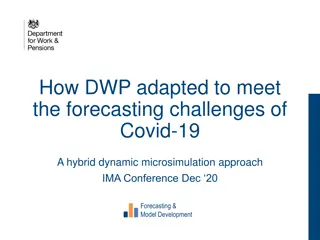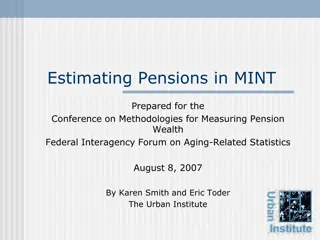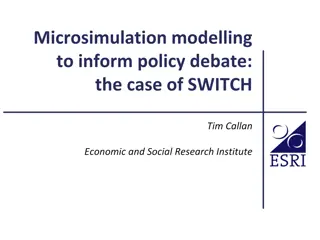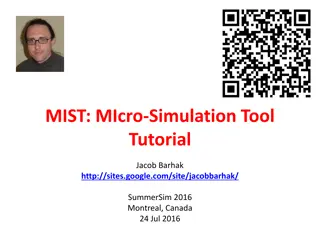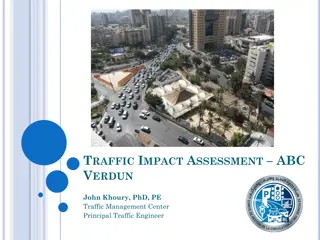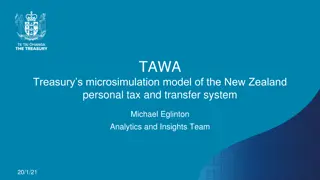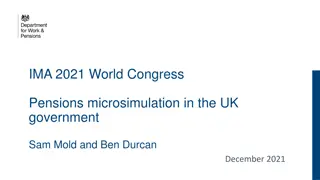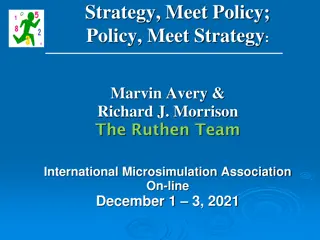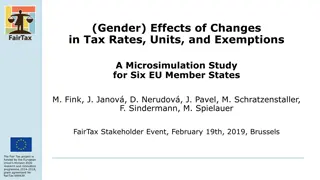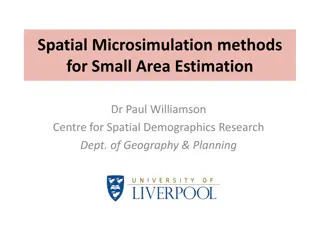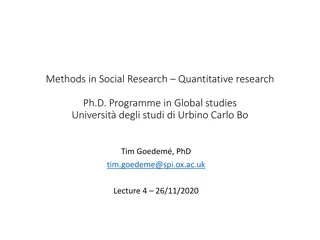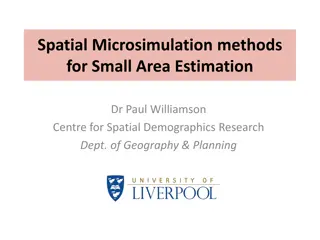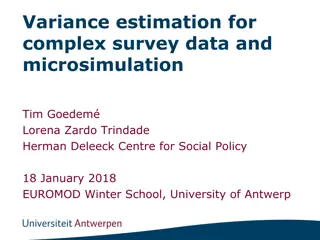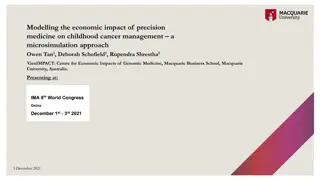EVE Model for Indirect Taxes Using Household Data
The EVE model developed by PBO analyzes household expenditure to estimate taxes paid on goods and services, facilitating the assessment of policy proposals' cost and impact. Utilizing microsimulation, EVE covers a range of indirect taxes like VAT, excises, and carbon tax, providing valuable insights
14 views • 19 slides
Variance Estimation for Complex Survey Data and Microsimulation
Variance estimation is crucial for evidence-based policy-making. This workshop, held at the EUROMOD Winter School, focused on the importance of estimating precision in statistics. Key messages include reporting standard errors, confidence intervals, and p-values based on sample estimates, and emphas
2 views • 13 slides
Dynamic Microsimulation Projection Tool for Developing Countries
The DYNAMIS project, funded by the World Bank, aims to demonstrate the feasibility of dynamic microsimulation for population projections in developing countries. This portable platform offers highly disaggregated population projections and serves as a core component for simulating social development
6 views • 24 slides
Enhancing Traffic Signal Design for Pedestrian Safety
The research focuses on developing strategies to improve traffic signal functionality for pedestrians and cyclists. It explores the impact of pedestrian recall and actuation on traffic operations and safety, investigating factors such as pedestrian volume thresholds. Using microsimulation models on
2 views • 13 slides
Adapting DWP Forecasting for Covid-19 Challenges Using Hybrid Dynamic Microsimulation Approach
DWP adapted its forecasting for Covid-19 challenges by implementing a hybrid dynamic microsimulation approach at the IMA Conference in Dec '20. The organization's strong track record in microsimulation includes developments in AnyLogic translation, working age modeling, and forecasting. The plan inv
1 views • 11 slides
Estimating Pensions in MINT: Data Sources and Projections
This document discusses the Model of Income in the Near Term (MINT) microsimulation data system, detailing its projections on income, assets, taxes, and demographic characteristics for birth cohorts up to 2099. It explores data sources such as the Survey of Income and Program Participation (SIPP), S
2 views • 28 slides
Microsimulation Modelling to Inform Policy Debate: The Case of SWITCH
This presentation discusses the usage of the SWITCH microsimulation model to inform policy debates by simulating the impact of tax and welfare policy reforms on household incomes and work incentives. It covers the areas investigated using SWITCH, selected users of SWITCH research, and the role of SW
5 views • 21 slides
Introduction to MIST Micro-Simulation Tool for Disease Modeling
Explore MIST, a Python framework supporting chronic disease modeling with High Performance Computing. Learn about its features, installation on Ubuntu/Linux and Windows, activation, and a simple disease model example. Access MIST on GitHub for free, and delve into the world of microsimulation for pr
4 views • 24 slides
Traffic Impact Assessment for ABC Verdun Project
The Traffic Impact Assessment for the ABC Verdun project, led by John Khoury, PhD, PE, provides detailed analysis on traffic counts, scenarios, intersection conditions, microsimulation results, and recommendations for a mega-scale mall opening in the area. The assessment includes traffic data collec
5 views • 10 slides
TAWA Treasury Microsimulation Model of NZ Tax System
The TAWA Treasury microsimulation model is a crucial tool used for estimating costs and impacts of tax and welfare policies in New Zealand. This model aids in understanding income distribution and poverty projections, helping various government agencies and academic collaborations make informed deci
0 views • 4 slides
Pensions microsimulation in the UK government
PENSIM is a dynamic microsimulation model used by the UK Department for Work and Pensions (DWP) to analyze long-term implications of government policies on pensions. It simulates private and state pension accumulation up to 2100, aiding in in-depth analysis of income distributions, policy scenarios,
6 views • 12 slides
Microsimulation for Financial Planning and Policy Analysis
In this presentation, Marvin Avery and Richard J. Morrison discuss the importance of incentives, traditional longitudinal dynamic microsimulation modeling, and the challenges faced by traditional models regarding incentives and data limitations. They introduce Ruthen, a microsimulation package speci
3 views • 15 slides
Gender Effects of Tax Changes: Microsimulation Study in EU Member States
Tax rates, units, and exemptions impact income distribution. This study analyzes gender-specific effects in six EU countries, examining factors like progressive vs. flat tax schedules and joint vs. individual taxation.
3 views • 19 slides
Spatial Microsimulation Methods for Small Area Estimation
Spatial microsimulation methods, as discussed by Dr. Paul Williamson, involve direct survey estimation, conventional small area estimation (SAE) approaches, and spatial microsimulation techniques. The process includes recalibrating survey data to meet local area constraints, such as ethnic and age d
0 views • 29 slides
Exploring the health outcomes of various pan-Canadian cervical cancer screening Programs using microsimulation modelling
This study evaluates the impact of Pap, HPV DNA, and combined testing on cervical cancer outcomes in Canada. The research aims to inform cancer control policies and decision-making by assessing various screening strategies.
2 views • 21 slides
Quantitative Research Techniques for Identifying Causal Relationships
Quantitative research methods like experiments, regression analysis, and tax-benefit microsimulation are explored for identifying causal relationships in social research. The lecture discusses experimental design, including random assignment, control groups, and potential biases. Risks and limitatio
0 views • 44 slides
Quantitative Research Techniques in Social Studies
This course provides an overview of quantitative research methods in social studies, focusing on identifying drivers and causes. It covers experimental design, regression analysis, and tax-benefit microsimulation to understand causal relationships, with a discussion on risks and limitations of exper
2 views • 14 slides
Spatial Microsimulation Methods for Small Area Estimation with Dr. Paul Williamson
Explore spatial microsimulation methods for small area estimation in geographical research, focusing on direct survey estimation, conventional SAE approaches, and unconventional SAE approaches like spatial microsimulation. Learn about techniques, challenges, and potential solutions in small area est
3 views • 29 slides
Dynamic Microsimulation Modelling: NIESR Parameterisation Study
Delve into the challenge of model parameterisation for dynamic microsimulation at the National Institute. Explore the approach, core characteristics, and objective function of the NIESR model. Uncover the focus on medium to long-term planning for savings and retirement, along with the adopted parame
0 views • 17 slides
Effective Variance Estimation for Survey Data and Microsimulation
Learn about the importance of estimating sampling variance for complex survey data and microsimulation, along with the requirements and communication strategies involved. Get insights into statistical reliability, mode of data collection, and comparability of income variables for evidence-based poli
0 views • 20 slides
Economic Impact of Precision Medicine on Childhood Cancer Management
Explore the economic impact of precision medicine on childhood cancer management through a microsimulation approach. Genomic-guided precision medicine offers a paradigm shift in treatment strategies, potentially improving outcomes and reducing side effects. Cost-effectiveness analysis is crucial for
4 views • 18 slides
Travel Modelling Group Steering Committee Meeting Highlights
Explore the key discussions and updates from the Travel Modelling Group Steering Committee meeting, including progress on tools, network development, and the GTAModel Version 4.0. Discover advancements in model development and application tools, network optimization, microsimulation features, and th
3 views • 28 slides
Distributional Impact of Carbon Taxes in EU Countries
Explore the distributional impact of carbon taxes and mitigation options in five EU countries. The research aims to understand the implications of a common carbon tax across Hungary, Portugal, Ireland, Finland, and Luxembourg, with a focus on compensating those negatively affected. Various revenue r
0 views • 16 slides
